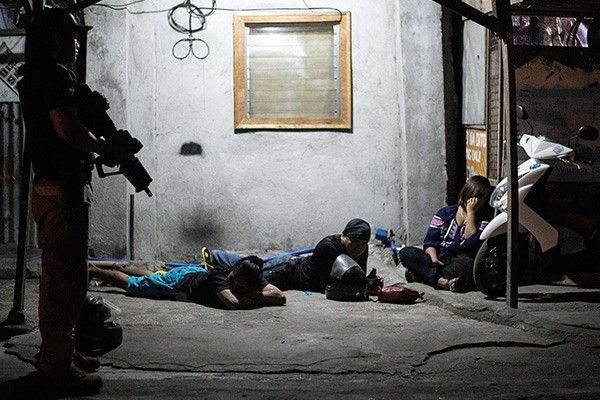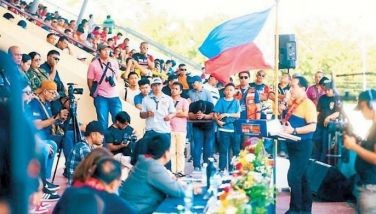PNP told: Cooperate with investigations if EJKs do not exist

MANILA, Philippines — Instead of defending its purported gains in the so-called war on drugs, the national police should cooperate with the bodies investigating its lapses and well-documented human rights abuses, an international rights monitor said Tuesday.
In a statement issued Tuesday, Phil Robertson, deputy Asia director of the New York-based Human Rights Watch called on the Philippine National Police to provide these investigating bodies, including the Office of the United Nations High Commissioner for Human Rights and the country's own Commission on Human Rights, full access to police records on its anti-drug operations.
This comes after Police Gen. Camilo Cascolan, the newest chief of the PNP denied that the extra-judicial killings linked to these operations even existed.
READ: PNP chief: Government not sponsoring extrajudicial killings
"Cascolan’s outright denial that extrajudicial killings took place in the government’s ‘drug war’ is a blatant attempt to whitewash the sordid record of the PNP. Respected human rights groups and the UN Office of the High Commissioner for Human Rights have comprehensively documented these EJKs since the start of Duterte’s ‘war on drugs'," Robertson said.
"Numerous victims, their families, and witnesses have repeatedly pointed out police misconduct during drug raids where police not only illegally killed suspects but manufactured and planted bogus evidence, such as guns, to claim that victims were armed when they were killed," he also said.
Earlier in June, United Nations High Commissioner for Human Rights Michelle Bachelet slammed the administration's campaign—a flagship of President Rodrigo Duterte electoral platform—for its widespread and "grave violations" of human rights.
'EJKs do not exist, are not gov't sponsored'
Speaking at his first press conference as the country's top cop, Cascolan, one of the masterminds behind Oplan Tokhang, rejected the notion of extra-judicial killings, saying they did not exist but also that many police officers were also casualties.
Cascolan at the same briefing pointed instead to the agency's efforts to stop the proliferation of illegal drugs and vowed a tougher stance towards illegal drugs and the coronavirus pandemic.
This, while he also earlier said that it was time to update the drug war's existing strategies, which were first crafted in 2016.
"We will no longer be regarded as just enforcers in the checkpoints. We will have more presence in barangays. We will be closer to the people in this fight," he said.
“We will further push our fight against illegal drugs, another menace that insidiously destroys our people. We will be more aggressive in capturing high-value targets,” he added, vowing an intensified campaign against illegal narcotics, which has remained largely unhampered by the community quarantines.
READ: Despite police claims, drug war killings continue amid COVID-19 lockdown — int'l rights monitor
In a press conference in late May, the Human Rights Watch also disclosed its report that found that Oplan Tokhang continues behind the scenes despite the coronavirus-induced lockdowns, with the nightly killings more difficult to document.
'Cooperate with investigations if PNP is innocent'
For Robertson, the pronouncement is another attempt at dodging accountability, and if Cascolan and the PNP are truly innocent, then they should cooperate with ongoing investigations, which administration officials routinely slam in public statements.
READ: NewsLab: The War on Drugs
According to local and international rights monitors, over 30,000 Filipinos have been casualties of the summary vigilante-style executions linked to the so-called "war on drugs."
Even the PNP's own numbers say that over 5,000 were killed in official police operations, many of whom were listed as "drug personalities" and whom police said violently resisted arrest.
"Instead of burying his head in the sand in this cynical and self-interested attempt to evade accountability, Cascolan should ensure that the PNP fully cooperates with investigating bodies such as the Commission on Human Rights, human rights NGOs, as well as international mechanisms such as the OHCHR, starting with the PNP providing investigators with full access to police records of these operations," Robertson said.
"If the PNP has nothing to hide, it should welcome those who want to ferret out the truth in the ‘drug war.’"
— with a report from Gaea Katreena Cabico
Reuters wins Pulitzers, the most prestigious awards in American journalism, in international reporting for its story on the methods of police killing squads in President Rodrigo Duterte’s war on drugs and for feature photography documenting the Rohingya refugee crisis in Myanmar and Bangladesh.
In covering the deadly drug war in the Philippines, Reuters reporters Clare Baldwin, Andrew R.C. Marshall and Manuel Mogato "demonstrated how police in the president’s 'drug war' have killed with impunity and consistently been shielded from prosecution," Reuters Editor-in-Chief Stephen J. Adler says.
Sen. Francis Tolentino says he has agreed to serve as legal counsel for Sen. Bato dela Rosa before the International Criminal Court. — Xave Gregorio
Sen. Ronald "Bato" Dela Rosa says he is “not worried” of the ICC’s resumption of investigation into the brutal war on drugs.
The Commission on Human Rights welcomes the verdict of a Caloocan court that convicted police officer Jeffrey Perez of torture and planting of evidence in the killings of teenagers Carl Arnaiz and Reynaldo “Kulot” de Guzman during former President Rodrigo Duterte’s campaign against illegal drugs.
"The Commission hopes that more cases similar to Carl and Kulot will reach the courts," the government agency says in a statement.
"We hope that more eye witnesses will step forth and feel encouraged to help progress the thousands of drug-related killings still pending investigations and trials," it adds.
The United Nations Office of the High Commissioner for Human Rights' work on the Philippines "is far from done" as victims of the bloody "war on drugs" continue to seek accountability and justice, the Human Rights Watch says.
"The Human Rights Council should adopt OHCHR’s recommendation that the high commissioner’s office continue to monitor and regularly report on the country’s rights situation," Carlos Conde, the senior researcher for Asia Division of the HRW, says in a statement.
"There’s no short-term solution to making real progress on accountability and providing justice for people in the Philippines," he adds.
Gabriela Women's Party supports the request of International Criminal Court Prosecutor Karim Khan to resume probe on President Duterte's drug war killings. — The STAR/Sheila Crisostomo
- Latest
- Trending































